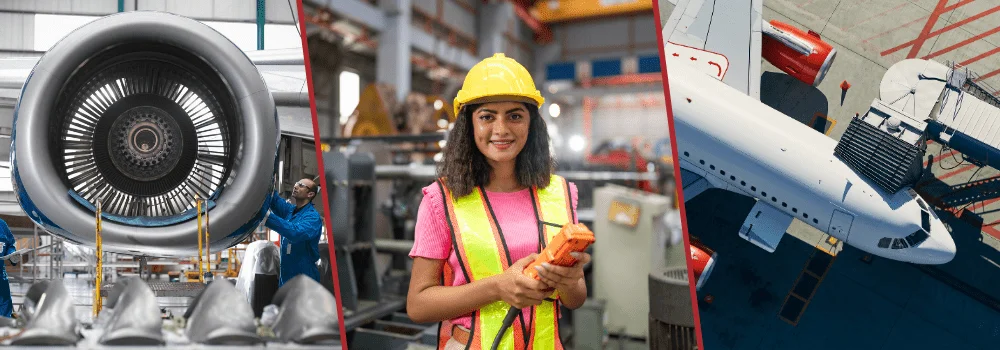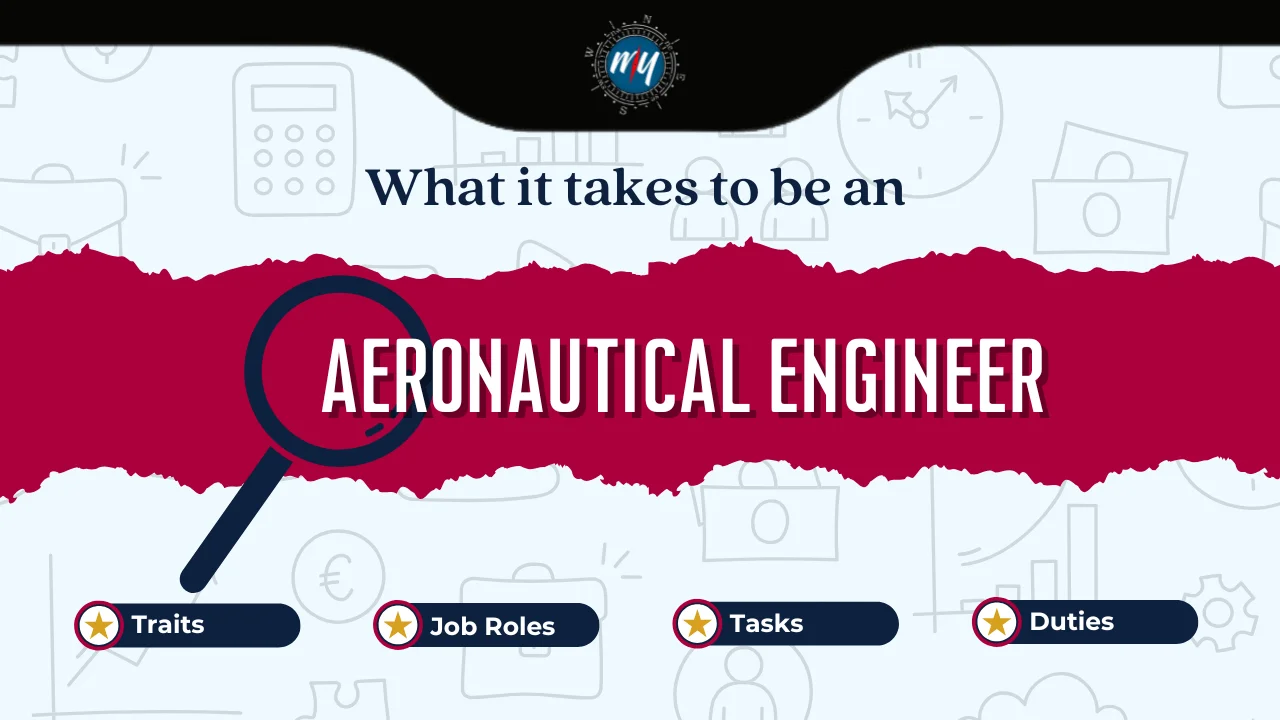How to Become an Aeronautical Engineer?
Learn the steps, qualifications, and opportunities to start your career as an aeronautical engineer right after 12th grade.

In this Career Outline

Introduction to Aeronautical Engineer
"The sky is not the limit; it's just the beginning for an aeronautical engineer. With dedication and a solid education, you can help shape the future of aviation." — Dr. Sally Ride
Ever watched a plane take off and wondered about the magic behind its flight? How to become an Aeronautical Engineer, Aeronautical engineering is where that magic begins, turning science fiction into reality. This field combines passion with precision, pushing the boundaries of technology to explore new frontiers. Let’s dive into how you can transform your fascination with aircraft into a thrilling career as an aeronautical engineer.
Steps to Become an Aeronautical Engineer:
Step-1
Focus on science and math in high school.
Step-2
Opt for Physics, Chemistry, and Mathematics (PCM) in 12th grade.
Step-3
Pursue B.Tech/B.E. in Aeronautical Engineering.
Step-4
Explore M.Tech/MS or Ph.D. for advanced studies.
Step-5
Acquire practical experience through internships and projects within the aerospace industry.
Step-6
Enhance your soft skills including teamwork, communication, and problem-solving abilities.
Step-7
Obtain licenses or certifications like PE or PMP.
Step-8
Apply for jobs in aerospace companies.
Step-9
Stay updated with the latest advancements and pursue further education.
Eligibility Criteria
| Eligibility Criteria | Description |
|---|---|
| Eligibility | 50% aggregate from a recognized institution in 12th |
| Educational Background | Complete 12th grade with Physics, Chemistry, and Mathematics (PCM). |
| Undergraduate Degree | Pursue a Bachelor’s in Aeronautical or Aerospace Engineering. |
| Postgraduate Degree | Consider a Master's or Ph.D. for advanced specialization (optional). |
| Entrance Exams | Qualify exams like JEE Main, JEE Advanced, BITSAT, or state-level engineering entrance tests. |
- . Must have at least 50% aggregate in 12th grade from a recognized board (PUC/CBSE/ICSE/ISC, etc.) with a science background.
- Need a valid score in Entrance exams after 12th like JEE-Main, KIITEE, SRMJEE, CEE, HITSEE, CET, etc., depending on the college. Some colleges conduct their own exams if JEE scores are not sufficient.
- Required to earn a degree in B.Sc/B. Tech or a Diploma in how to become an aeronautical engineer after 12.
- Optional: Consider pursuing an M.Tech in Aeronautical Engineering for advanced knowledge and career prospects.

Not eligible to pursue this career?
Find out different career options based on your current academic accomplishments. Enquire with our career experts and build a roadmap to your career success!
Tasks to perform as an Aeronautical Engineer:
Knowledge & Skills Required
Aeronautical engineers need a diverse set of competencies to excel in their roles. Below are the essential knowledge areas and skill sets required for success in this field:
| Knowledge Required | |
|---|---|
| Understanding of airflow and its impact on aircraft. | Insights into engines and propulsion systems. |
| Knowledge of materials used in aircraft construction. | Ability to assess and design aircraft structures |
| Proficiency in software used for designing aircraft components. | Understanding of flight control and stability. |
| Skills Required | |
|---|---|
| Analytical Thinking | Communication |
| Attention to Detail | Project Management |
| Manual Dexterity | Holistic Health Approach |
| Team Collaboration | Technical Writing |

The Knowlegde and Skills don't intrigue you?
Your career may not align with your interests. Identify them and match with careers requiring those skills for faster growth and success!
Job Roles Offered for an Aeronautical Engineer:
Once you procure the required qualifications for becoming an Aeronautical Engineer, a myriad of options are open to you. There are multiple projects you can undertake throughout this line of work, and there are these Best courses after 12th and many other fields you can branch out to as well.
A Design Engineer interacts with customers to understand their requirements, collaborates with various departments to develop strategies that enhance user experience, and balances project elements like safety and design. They research new technologies and best practices to find cost-effective solutions, working for major corporations to meet customer demands and advance their career from junior roles as their company expands.
An Aviation Maintenance Manager ensures aircraft operate efficiently by overseeing repairs, conducting inspections, and upgrading planes as needed. They ensure safety through routine and emergency maintenance, including engine assessments, electronic system checks, and compliance with safety regulations.
Ensures product quality during manufacturing by employing various standards such as usability, endurance, security, and efficiency. They inspect components, processes, and systems to detect and resolve performance issues, often training and supervising team members. Typically holds a bachelor's degree, with many having postgraduate qualifications in related fields like Computer Science or Software Engineering.
Ensures safe and smooth aircraft operations through repairs, periodic maintenance, and upgrades. They comply with regulatory requirements and may work flexible hours depending on the organization. Tasks include assessing, repairing, and testing aircraft components and systems to maintain safety and functionality.
Supervises product manufacturing to ensure quality, safety, and cost-effectiveness. They use principles of thermodynamics to design and oversee the production of various mechanical systems or devices. Typically employed in offices, labs, or industrial settings, they ensure products meet engineering standards and specifications.

Not sure where you fit in?
With countless career options, choosing the right path can be tough. Analysis and guidance sessions help clarify what to study, pursue, and achieve.
Career Opportunities for an Aeronautical Engineer:
Aeronautical Engineer can opt for various fields of work in the companies listed below:
| Lockheed Martin | Applied Marticles Inc. | Boeing |
| QuEST Global Engineering | Asteria Aerospace | Cyient |
| Lam Research | JetAvi Engineering | Sapcon Instruments |
| Air Products |
Colleges Offering Courses in Aeronautical Engineering:
| Manipal Institute of Technology, Manipal | IST - Indian Institute of Space Science and Technology, Thiruvananthapuram |
| Dayananda Sagar College of Engineering, Bangalore | Kumaraguru College of Technology, Coimbatore |
| Sathyabama Institute of Science and Technology, Chennai | Bannari Amman Institute of Technology, Erod |
| Dr. Ambedkar Institute of Technology, Bangalore | Madras Institute of Technology, Chennai |
| HITS Chennai - Hindustan Institute of Technology and Science | Nitte Meenakshi Institute of Technology, Bangalore |
End Note
Becoming an aeronautical engineer is an exciting journey that blends a passion for flight with technical expertise. Whether you dream of designing the next generation of aircraft or exploring space frontiers, this field offers endless possibilities. Ready to take off on your career path? Connect with SetMyCareer for expert Career counselling after graduation and guidance that will turn your aspirations into reality.
In this Career Outline
You don't fit in as an Aeronautical Engineer?
Find out your best suitable career by booking an appointment with our experts
Book nowGet In Touch
No. 14/595, 1st Floor, Nanjappa Reddy Layout, Koramangala 8th Block, Bangalore 560095






